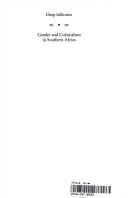| Listing 1 - 3 of 3 |
Sort by
|

ISBN: 9042012293 9042012196 9789042012196 9789042012295 9789004486416 9004486410 Year: 2002 Publisher: Leiden;Boston BRILL
Abstract | Keywords | Export | Availability | Bookmark
 Loading...
Loading...Choose an application
- Reference Manager
- EndNote
- RefWorks (Direct export to RefWorks)
Deep hiStories represents the first substantial publication on gender and colonialism in Southern Africa in recent years, and suggests methodological ways forward for a post-apartheid and postcolonial generation of scholars. The volume's theorizing, which is based on Southern African regional material, is certain to impact on international debates on gender - debates which have shifted from earlier feminisms towards theorizations which include sexual difference, subjectivities, colonial (and postcolonial) discourses and the politics of representation. Deep hiStories goes beyond the dichotomies which have largely characterized the discussion of women and gender in Africa, and explores alternative models of interpretation such as 'genealogies of voice'. These 'genealogies' transcend the conventional binaries of visibility and invisibility, speaking and silence. Works covering South Africa from the eighteenth to the twentieth century and Zimbabwe, Namibia and Cameroon in the twentieth include: • Colonial readings of Foucault • Ideologies of domesticity • Torture and testimony of slave women • Women as missionary targets • Gender and the public sphere • Race, science and spectacle • Male nursing on mines • Infanticide, insanity and social control • Fertility and the postcolonial state • Literary reconstructions of the past • Gender-blending and code-switching • De/colonizing the queer The collection includes diverse research on the body in Southern Africa for the first time. It brings new subtleties to the ongoing debates on culture, civility and sexuality, dealing centrally with constructions of race and whiteness in history and literature. It is an important resource for teachers and students of gender and colonial studies.
Afrique australe --- History of civilization --- South Africa --- Sex role --- Women --- Rôle selon le sexe --- Femmes --- Social conditions. --- Conditions sociales --- Africa, Southern --- Colonization --- History. --- Colonisation --- Histoire --- Social conditions --- Imperialism --- Land settlement --- Colonies --- Decolonization --- Emigration and immigration --- Human females --- Wimmin --- Woman --- Womon --- Womyn --- Females --- Human beings --- Femininity --- Gender role --- Sex (Psychology) --- Sex differences (Psychology) --- Social role --- Gender expression --- Sexism --- Gender roles --- Gendered role --- Gendered roles --- Role, Gender --- Role, Gendered --- Role, Sex --- Roles, Gender --- Roles, Gendered --- Roles, Sex --- Sex roles --- Colonial studies --- South africa
Book
ISBN: 9781776140381 Year: 2017 Publisher: Johannesburg : Wits University Press,
Abstract | Keywords | Export | Availability | Bookmark
 Loading...
Loading...Choose an application
- Reference Manager
- EndNote
- RefWorks (Direct export to RefWorks)
Remains of the Social is an interdisciplinary volume of essays that engages with what 'the social' might mean after apartheid; a condition referred to as 'the post-apartheid social'. The volume grapples with apartheid as a global phenomenon that extends beyond the borders of South Africa between 1948 and 1994 and foregrounds the tension between the weight of lived experience that was and is apartheid, the structures that condition that experience, and a desire for a 'postapartheid social' (think unity through difference). Collectively, the contributors argue for a recognition of the 'the post-apartheid' as a condition that names the labour of coming to terms with the ordering principles that apartheid both set in place and foreclosed. The volume seeks to provide a sense of the terrain on which 'the post-apartheid' - as a desire for a difference that is not apartheid's difference - unfolds, falters and is worked through.
Multi
ISBN: 9781776140381 Year: 2017 Publisher: Johannesburg Wits University Press
Abstract | Keywords | Export | Availability | Bookmark
 Loading...
Loading...Choose an application
- Reference Manager
- EndNote
- RefWorks (Direct export to RefWorks)
Remains of the Social is an interdisciplinary volume of essays that engages with what 'the social' might mean after apartheid; a condition referred to as 'the post-apartheid social'. The volume grapples with apartheid as a global phenomenon that extends beyond the borders of South Africa between 1948 and 1994 and foregrounds the tension between the weight of lived experience that was and is apartheid, the structures that condition that experience, and a desire for a 'postapartheid social' (think unity through difference). Collectively, the contributors argue for a recognition of the 'the post-apartheid' as a condition that names the labour of coming to terms with the ordering principles that apartheid both set in place and foreclosed. The volume seeks to provide a sense of the terrain on which 'the post-apartheid' - as a desire for a difference that is not apartheid's difference - unfolds, falters and is worked through.
| Listing 1 - 3 of 3 |
Sort by
|

 Search
Search Feedback
Feedback About UniCat
About UniCat  Help
Help News
News